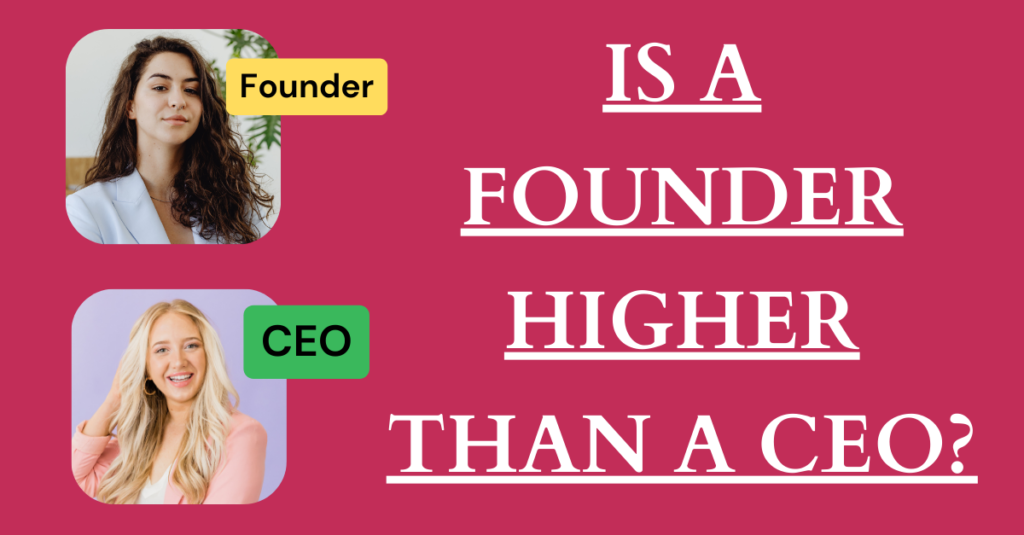Is a Founder Higher than a CEO?
Introduction
In the world of business, the roles of a founder and a CEO are both crucial and distinctly different. Founders are the creative minds behind a company’s inception, imbuing it with passion and purpose. CEOs, on the other hand, are responsible for the day-to-day operations and strategic decision-making to drive the company forward. But as companies evolve and grow, the question arises: “Is a founder higher than a CEO?” Exploring this topic delves into the power dynamics of corporate leadership and the unique contributions of both founders and CEOs. In this article, we will examine the roles, responsibilities, and influence of founders and CEOs, analyze case studies of successful companies, and ultimately assess whether one position holds greater authority or if their coexistence is the key to a company’s success.
- The Distinct Attributes of Founders and CEOs
Founders possess a vision and passion that often goes beyond the bottom line. They are driven by their original ideas and have an intimate connection with the company’s mission and values. A founder’s ability to see opportunities where others may not, along with their fearlessness in taking risks, forms the foundation of many successful ventures.
CEOs, on the other hand, are adept at navigating the complexities of business operations. They bring years of experience and strategic acumen to the table, ensuring the company’s efficient functioning and growth. CEOs are skilled in managing resources, establishing corporate strategies, and fostering a culture that aligns with the company’s goals.
- The Founder’s Influence and Legacy
A founder’s influence on a company can extend far beyond their initial role. Their personality, values, and vision often become ingrained in the company culture, shaping its identity for years to come. Many iconic companies, such as Apple with Steve Jobs, Microsoft with Bill Gates, and Virgin with Richard Branson, continue to embody the spirit and principles of their founders, even long after their departure from the CEO position.
A strong founder’s influence can be both a blessing and a challenge for the CEO. While it provides a strong sense of purpose and direction, it can also lead to potential clashes between the founder’s vision and the CEO’s operational decisions. Striking the right balance between preserving the founder’s legacy and driving the company forward can be a delicate task.
- The CEO’s Operational Leadership
The CEO plays a vital role in translating the founder’s vision into actionable plans. They are responsible for assembling a competent leadership team, setting clear goals, and executing strategies that bring the founder’s dreams to fruition. CEOs are focused on optimizing efficiency, maintaining financial stability, and ensuring that the company adapts to changes in the market and industry.
To succeed as a CEO, one must possess exceptional leadership and interpersonal skills. They need to be able to communicate effectively, inspire the workforce, and make challenging decisions, often under intense scrutiny. In contrast to the founder’s visionary mindset, a CEO must be pragmatic and results-driven, effectively managing the company’s day-to-day affairs.
- The Power Dynamics: Founder vs. CEO
One of the key points of contention regarding the founder-CEO relationship is the question of who holds greater power. While the CEO assumes operational control, founders may retain significant influence due to their emotional attachment and substantial ownership stake in the company. This can lead to tensions between the two roles, with potential clashes over strategic direction and corporate governance.
In some cases, founders may even return to the CEO position after temporarily stepping down, reasserting their leadership and vision for the company. Elon Musk’s return to Tesla as CEO in 2016 is a notable example, highlighting the founder’s ability to reclaim the reins when they feel the need to steer the company back on track.
- Case Studies and Examples
To gain a deeper understanding of the dynamics between founders and CEOs, let’s examine some notable case studies:
a. Apple Inc. – Steve Jobs, the visionary co-founder, was instrumental in shaping Apple’s identity and innovation-driven culture. After his departure, Apple faced a turbulent period until Jobs returned in 1997, leading the company to new heights with iconic products like the iPod, iPhone, and iPad.
b. Google (now Alphabet Inc.) – Larry Page and Sergey Brin co-founded Google, transforming it into a global tech giant. Sundar Pichai took over as CEO in 2015, successfully managing the company’s expansion into various areas like artificial intelligence, cloud computing, and autonomous vehicles.
c. Amazon – Jeff Bezos, the visionary founder of Amazon, guided the company from an online bookstore to an e-commerce behemoth and tech innovator. In 2021, Bezos stepped down as CEO, passing the torch to Andy Jassy, who had been instrumental in developing Amazon Web Services (AWS).
- Embracing Synergy for Success
In the debate over whether a founder is inherently higher than a CEO, it is crucial to recognize the symbiotic relationship between the two roles. Founders bring creativity, vision, and passion, laying the groundwork for the company’s success. CEOs, on the other hand, provide operational expertise, stability, and strategic direction to ensure the company remains agile and competitive.
Rather than pitting these roles against each other, companies can benefit from cultivating a collaborative environment where founders and CEOs work in harmony. Successful examples like Microsoft’s transition from Bill Gates to Steve Ballmer, and subsequently, to Satya Nadella, demonstrate how effective leadership transitions can foster innovation and continuous growth.
Conclusion
In conclusion, the question of whether a founder is higher than a CEO is multifaceted and does not have a definitive answer. Founders and CEOs bring distinct strengths to a company, and their coexistence is essential for a well-rounded leadership approach. The power dynamics between the two roles can vary depending on individual circumstances, the company’s lifecycle, and the founder’s level of involvement.
Ultimately, the success of a company lies in embracing the synergistic relationship between founders and CEOs. By recognizing and leveraging the unique attributes each brings, organizations can chart a path to sustained growth and prosperity, regardless of who occupies the top executive positions. The collaborative efforts of visionary founders and strategic CEOs create a winning formula for sustainable success in today’s ever-evolving business landscape.

My name is Rohit Vagh and I’m a content writer specializing in fashion and lifestyle. I have three years of experience in this field and have written various articles. My writing style is creative and engaging, and I strive to create content that resonates with my readers. I have a deep passion for fashion and am constantly researching the latest trends and styles to make sure my readers are up to date. I’m excited to continue my career in blogging, and I’m always looking for new opportunities in the fashion and lifestyle space.





